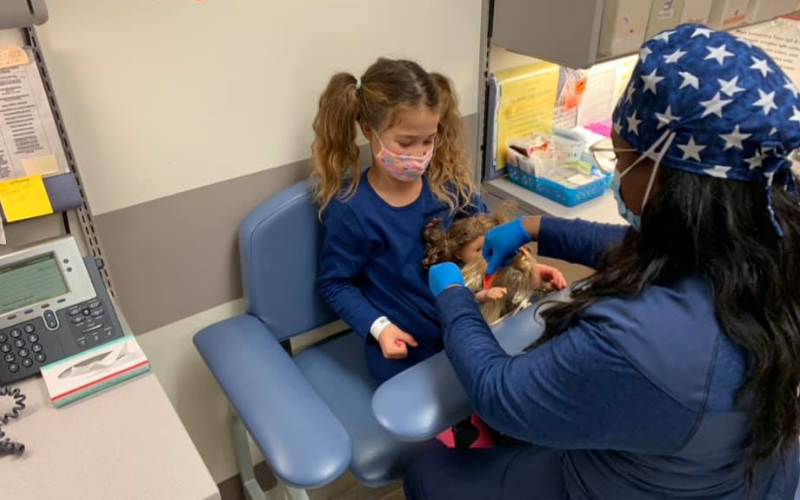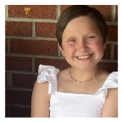
In March, as the world locked down in the wake of the COVID-19 pandemic, Lakelynn was rocketed into uncharted territory.
By: Trish Adkins
In February 2020, 7-year-old Lakelynn’s normal routine included monthly plane rides from her home in Raleigh to Boston for her clinical trial treatment for a rare, inoperable sarcoma in her arm.
Then, in March, as the world locked down in the wake of the COVID-19 pandemic, Lakelynn’s routine had to change. Suddenly she was grounded in Raleigh, and while her Boston doctor made sure she could continue on the lifesaving clinical trial locally, the new hospital and new pandemic protocol rocketed Lakelynn and her family into uncharted territory.
“We were so nervous about being in the hospital and exposing ourselves to COVID-19. We were super focused on not touching things, controlling our body, keeping our masks on and taking this day on with unfamiliar faces. Sean, her favorite nurse, ‘sent his powers,’ so her IV would go smoothly and she would be brave and courageous... and she was,” said Leslie, Lakelynn’s mom.
Sadly, stories like Lakelynn’s are not unique. The COVID-19 pandemic has heaped a bevy of additional problems and complications on already-burdened caregivers of children diagnosed with cancer. And even as there appears to be some glimmers of light at the end of the COVID-19 pandemic, the burden on childhood cancer families continues to be heavier than ever.
Alex’s Lemonade Stand Foundation (ALSF)-funded researcher and associate professor in the Department of Neurosurgery at Duke University School of Medicine, Kyle Walsh, PhD, surveyed 360 parents and caregivers of children currently in treatment or still being monitored for cancer about the impact of the COVID-19 pandemic as part the of My Childhood Cancer: Survey Series. My Childhood Cancer is an ongoing data collection and survey project funded by ALSF that seeks to gain valuable insight into the experience of families throughout their childhood cancer journey.
The survey was conducted in the early months of the pandemic, between April and May, 2020. The results were published in the journal Pediatric Blood & Cancer this month.
Dr. Walsh and his team reported that 77% of parents of children in treatment or being monitored for cancer, reported increased feelings of anxiety and 64% reported feeling more sad or depressed than before the outbreak.
"Parents and caregivers of children who have cancer are already under tremendous stress," said lead author, Kyle Walsh, PhD, associate professor in the Department of Neurosurgery at Duke University School of Medicine. "And while the pandemic has impacted everyone, the isolation, job losses, reduced wages, school closings and other effects of the pandemic have hit families whose children have cancer especially hard."
Half of the caregivers interviewed reported that their child had delayed or canceled appointments and 26% said their child’s medical follow-up had converted to telehealth visits. Like Lakelynn’s family, 9% of parents reported that the pandemic brought about logistical challenges to traveling to appointments. These challenges including traveling distances for care and figuring out how to manage children at home with virtual school and children who need to be at the clinic for appointments.
The study also asked about the economic impact of the pandemic. Twenty-eight percent reported lost household wages due to the pandemic, with 11% having difficulty paying for basic needs and 5% straining to pay for their child's medical care.
Last year, ALSF launched the COVID-19 emergency fund to support families during the pandemic by providing financial support for grocery store gift cards, extended hotel stays so families can remain close to treatment, and support for those traveling to their home hospital for standard treatments. ALSF has supplied COVID-19 emergency funds to more than 2,200 families and continues to get requests daily, as the pandemic continues.
For now, the information gathered in the survey will be helpful in determining how to improve outreach and social support for pediatric cancer patients and their families during the pandemic and beyond.
"This idea of trying to identify stress - where social work teams can intervene - will be helpful moving forward," Walsh said. "We understand that everybody is feeling stress and distress with COVID, but this is a uniquely at-risk population of children and parents and we need to make a more concerted effort to identify and alleviate this distress to the best we can."

